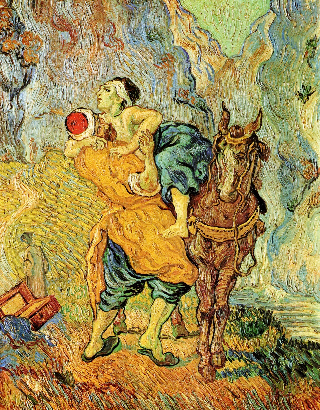Gesù è un maestro autentico e ricco d’empatia e di compassione, sia nei suoi atteggiamenti che nei suoi insegnamenti (cf. Gesù modello d’empatia integrale). In questo senso, la parabola del buon Samaritano (Lc 10,33-37) dimostra come le nozioni di empatia e di compassione siano al cuore del messaggio evangelico di Gesù. Vediamo quindi come queste due attitudini debbano ispirare e influire il giudizio morale e la condotta etica del discepolo di Cristo nelle sue relazioni interpersonali. L’atteggiamento del buon Samaritano è caratterizzato da una percezione morale autenticamente empatica rispetto alla situazione dell’uomo ferito: «Un Samaritano […] passandogli accanto, lo vide e ne ebbe compassione» (v. 33). Il senso esegetico di questo versetto significa che alla vista dell’uomo gravemente ferito, il buon Samaritano è commosso fino alle viscere; è colto da una compassione viscerale. In altri termini, la scena lo commuove profondamente scatenando in lui una intensa reazione emozionale empatica, così come una reazione compassionevole per aiutare il misero. Pertanto, la capacità del Samaritano di “mettersi nei panni dell’uomo ferito” e di essere sensibile alla sua sofferenza, apre il giudizio morale della sua coscienza all’empatia compassionevole. Infatti, la compassione spinge il buon Samaritano a prestare soccorso all’uomo ferito attraverso atti concreti:…
On September 27th I offered the Father of the Prodigal son for reflection as a model of capacious vulnerability. My comments on vulnerability last month might have surprised the reader who thinks of vulnerability primarily as the condition that raises alarm, concern, or the need to protect. I think of vulnerability, however, as that innate capacity we have to respond to the other who is at risk. Now I would like to take that insight further in a reflection on the Good Samaritan (Luke 10: 29-37). It is important for us to remember why Jesus tells this parable. He has just given the commandment to love one another. In response, one of the Scribes asked Jesus, “Who is my neighbor?” A close reading of the story reveals that Jesus is offering a very surprising answer to the question. At the beginning of the story we are thinking that the answer to the question “who is my neighbor?” is the man lying wounded on the road, that is, the precarious one. But by the end of the story we are no longer looking for the neighbor as the precarious one but at the vulnerable one who is acting. The Scribe rightly…


